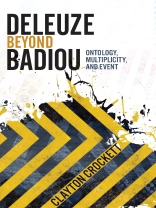First published in 1997, Alain Badiou’s
Deleuze: The Clamor of Being cast Gilles Deleuze as a secret philosopher of the One. In this work, Clayton Crockett rehabilitates Deleuze’s position within contemporary political and philosophical thought, advancing an original reading of the thinker’s major works and a constructive conception of his philosophical ontology. Through close readings of Deleuze’s
Difference and Repetition,
Capitalism and Schizophrenia (with Felix Guattari), and
Cinema 2, Crockett argues that Deleuze is anything but the austere, quietistic, and aristocratic intellectual Badiou had portrayed. Instead, Crockett underscores Deleuze’s radical aesthetics and innovative scientific, political, and mathematical forms of thought. He also refutes the notion Deleuze retreated from politics toward the end of his life. Using Badiou’s critique as a foil, Crockett maintains the profound continuity of Deleuze’s work and builds a general interpretation of his more obscure formulations.
Tabla de materias
Acknowledgments
Part I. Setting Up the Encounter
1. Introduction
2. The Clamor of Being: Badiou vs. Deleuze
Part II. Deleuze
3. A Repetition of Difference
4. Deleuze’s Logic of Double Articulation
5. Producing the Event as Machine
Part III. Badiou
6. Being a Sublime Event
7. Being a Subject in a Transcendental World
Part IV. Deleuze Beyond Badiou
8. Energetics of Being
9. Politics of the Event
10. Vodou Economics: Haiti and the Future of Democracy
Index
Sobre el autor
Clayton Crockett is associate professor and director of religious studies at the University of Central Arkansas. He is the author of several books, including
Radical Political Theology: Religion and Politics After Liberalism and coeditor, with Slavoj iek and Creston Davis, of
Hegel and the Infinite: Religion, Politics, and Dialectic.












